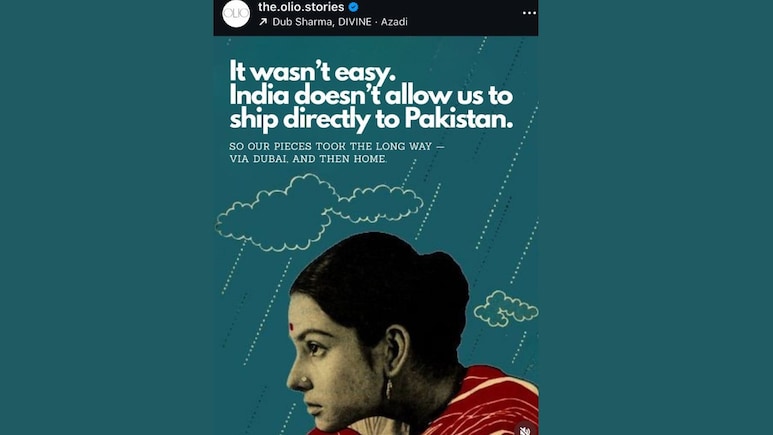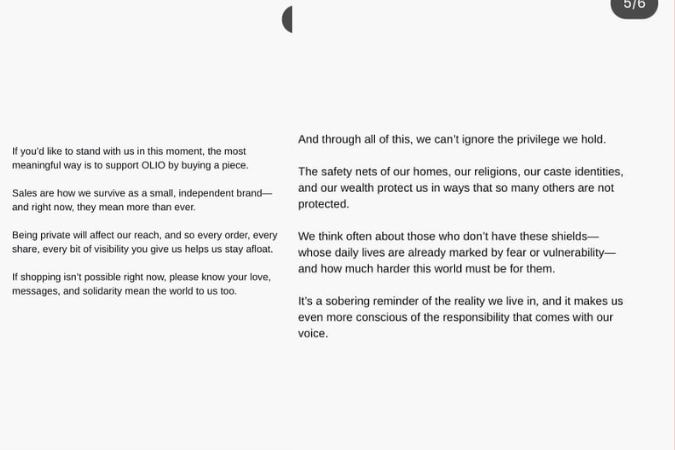
An Independence Day campaign meant to be a tribute has now landed an Indian jewellery brand at the centre of online hate (a lot of it). So much so, that the brand had to delete their posts from the campaigns, owners had to make all their social media presence, including the brand's account, private.
The incident occurred when the brand, Olio Stories, a label run by Aashna Singh and Sneha Saksena, was called out across social media after their new campaign 'Azadi' featured a distorted Indian map.
The video showed Kashmir as a separate country and Ladakh tucked inside China. It was not just a design slip-up - for many, it struck at the heart of national sentiment. To see them mishandled felt like a 'betrayal'.
'Azadi'
"Being someone who has never crossed the invisible lines of Partition, I sometimes think about our shared past. We are always told about the differences - cultures, faiths, and flags. Yet, it still feels so similar," said the audio of the now-deleted viral Reel that has sparked controversy.
The Reel showed a woman admiring rings and hand bands made of silver and gold, while a voice in the background narrated the lines. At the end, a flashy message popped up on the screen: "Azadi. Made in India. Worn in Pakistan. Loved Everywhere."
Olio Stories has been sharing distorted maps of India since the start. This 2023 post again shows Kashmir as part of Pakistan & China. After last year's backlash, it's hard to call this a ‘mistake'—more than an apology, they need to explain why they are doing this intentionally. pic.twitter.com/3wtPJyfzvt
— Nikita Bhatt (@NikitaBhatt491) August 18, 2025
The reel promoting 'Azadi' was taken down a few days later, but not before it spread like wildfire. The Reel was already shared online, and each and every post of the brand was under scrutiny.
Soon, screenshots of the wrong map started floating around, and the backlash was immediate. Hashtags criticising the brand picked up, and comments questioning their intent piled up in the thousands.
The outrage grew even more when social media users pointed out something else. The Olio Stories has openly said that they sell products in Pakistan through Dubai since direct shipping isn't allowed. They are also known to collaborate with Pakistani influencers.
This raised many Indian eyebrows. The timing, the naming of the collection, and the distorted map started to look less like a careless mistake and more like a deliberate stance for some.
The brand switched off comments on the controversial Reel. Not long after, their entire account was made private. But the silence only added more fuel to the fire.
A Brand With A Story
The reaction is harsher because Olio isn't just any small business. The brand was founded in November 2015 after Aashna and Sneha quit their jobs to start something of their own. What began as womenswear evolved into Olio Jewels, a line that tried to blend Indian history with modern design.
Their story has always been one of "friendship and creativity". From working out of a small space in Delhi to remote-working across continents, they built a community around their brand. In their own words, Olio was meant to be "a mixture of heterogenous elements" - a reflection of everything they loved and valued.

Deepika Padukone in Olio Jewellery. Photo: Olio Stores
It wasn't long before Olio became a celebrity favourite. The likes of Priyanka Chopra, Sonam Kapoor, Kalki Koechlin, Sobhita Dhulipala, Kriti Sanon, Ileana D'Cruz, Jacqueline Fernandez, Kubbra Sait and several influencers were spotted wearing their designs. With that kind of reach and visibility, every campaign they put out naturally came under more scrutiny.
The Backlash
On paper, the 'Azadi' collection was meant to be a powerful Independence Day tribute. The name itself suggested freedom and pride. But for many viewers, that sentiment fell flat the moment they saw the distorted map, and a wish for a notorious neighbour. What should have been a celebratory campaign was now being viewed as provocative and insensitive.
Worse, it wasn't just about the map anymore. Netizens began questioning why the brand seemed comfortable doing business in Pakistan while India officially has no trade ties with the country.
To top it off, Pakistan's Independence Day is just a day before India's. Critics argued that the campaign looked more like a nod to Pakistan than a tribute to India.
Social media doesn't let such controversies slip.
"Their organisation must be penalised, and a warning from a High Court would be appropriate," a user commented.
"This brand should be banned in India," another user said.
How The Brand Responded
NDTV was able to get access to the brand's page, and found that after days of silence, The Olio Stories finally addressed the controversy. In a long note, via two carousel posts, the founders thanked their supporters for messages and resources during what they called "some of the most intense days we've ever experienced." They said that their biggest worry was not just the business but the safety of their families, team members, and loved ones.
"We're hoping this storm passes soon and the trolls move on to another target," they wrote, admitting it was frightening to wonder if their business could survive the outrage, reports, and sheer scale of attacks.

They insisted that Olio has never been about politics, and at its core, the brand only stands for "peace, love, and harmony". Their work, they said, has always come from a place of togetherness - "bridging borders, telling stories, and sparking connection". At the same time, they admitted it might have been "short-sighted" to believe the world would always receive their intent that way.
The statement also took aim at the harassment they received, with the founders saying, "To those who've commented that we 'deserve' harassment or death threats - know that you'll soon be removed from our space. That kind of thinking has no place here."
They admitted the experience left them feeling "defeated but not broken". They urged supporters to stand with them by buying their pieces, pointing out that as a small independent brand, sales are their only way to survive.
The response closed with a reflection on privilege. They said their homes, religions, caste identities, and wealth gave them safety nets that many others in India do not have.
"We think often about those who don't have these shields, whose daily lives are already marked by fear or vulnerability, and how much harder this world must be for them," they wrote.
In a statement given to NDTV, a spokesperson from Olio says, "We are just two women trying to build something meaningful, and our campaign was never meant to be political. It came from a place of peace and togetherness. Unfortunately, an external asset we used contained a map error that slipped our notice. It was not created by us, but we take full responsibility for not catching it earlier. Since then, what we've faced has been terrifying—our personal details were doxxed, we received violent threats, and our families and team have been harassed. As women founders, this has been one of the scariest experiences of our lives. We've apologized sincerely, and our only priority now is keeping our team and families safe. At our core, OLIO has always stood for love, harmony, and storytelling through craft - never division."
The Bigger Question
The Olio Stories may be the one caught in this storm, but the debate is larger than a single campaign. It touches on the role brands play in national conversations. Fashion and jewellery labels are no longer judged only on the basis of their designs; they are held accountable for their messaging, their collaborations, and their political awareness.
In India, where the map is more than a geographical sketch, its misuse is not taken lightly. In the past too, companies and celebs have faced serious consequences for distorting the Indian map in campaigns or products.
For Olio, the fallout has been severe. Their attempt at celebrating freedom has ironically ended up silencing them. With their account locked, their campaign withdrawn, and their reputation in question, the brand finds itself in a very different spotlight - one that no jewellery collection can shine them out of.
Track Latest News Live on NDTV.com and get news updates from India and around the world

